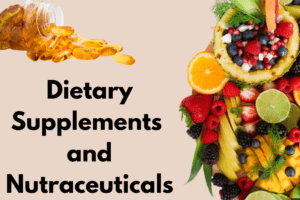Dietary Supplements and Nutraceuticals B. Pharma 8th Semester PDF Notes

Course Content:
Dietary Supplements and Nutraceuticals Unit-I
Definitions of Functional foods, Nutraceuticals, and Dietary supplements. Classification of Nutraceuticals, Health problems and diseases that can be prevented or cured by Nutraceuticals i.e. weight control, diabetes, cancer, heart disease, stress, osteoarthritis, hypertension, etc.
Public health nutrition, maternal and child nutrition. Nutrition and aging, nutrition education in the community.
Source, Name of marker compounds and their chemical nature, Medicinal uses and health benefits of following used as nutraceuticals/functional foods: Spirulina, Soybean, Ginseng, Garlic, Broccoli, Gingko, Flaxseeds.
Dietary Supplements and Nutraceuticals Unit-II
Phytochemicals as nutraceuticals: Occurrence and characteristic features (chemical nature medicinal benefits) of following:
Carotenoids: α and β-Carotene, Lycopene, Xanthophylls, leutin. Sulfides: Diallyl sulfides, Allyl trisulfide.
Polyphenolics: Reservetrol.
Flavonoids: Rutin, Naringin, Quercitin, Anthocyanidins, catechins, Flavones.
Prebiotics/Probiotics: Fructo-oligosaccharides, Lactobacillus. Phyto estrogens: Isoflavones, daidzein, Geebustin, lignans.Tocopherols.
Proteins, vitamins, minerals, cereal, vegetables, and beverages as functional foods: oats, wheat bran, rice bran, sea foods, coffee, tea, and the like.
Top Health & Fitness Book
Dietary Supplements and Nutraceuticals Unit-III
Introduction to free radicals: Free radicals, reactive oxygen species, production of free radicals in cells, damaging reactions of free radicals on lipids, proteins, Carbohydrates, and nucleic acids. Dietary fibers and complex carbohydrates as functional food ingredients.
Dietary Supplements and Nutraceuticals Unit-IV
Free radicals in Diabetes mellitus, Inflammation, ischemic reperfusion injury, Cancer, Atherosclerosis, Free radicals in brain metabolism and pathology, kidney damage, and muscle damage. Free radicals involvement in other disorders. Free- radical’s theory of aging.
Antioxidants: Endogenous antioxidants– enzymatic and non-enzymatic antioxidant defense, Superoxide dismutase, catalase, Glutathione peroxidase, Glutathione, Vitamin C, Vitamin E, α- Lipoic acid, melatonin. Synthetic antioxidants: Butylated hydroxy Toluene, Butylated hydroxy Anisole.
Functional foods for chronic disease prevention.
Dietary Supplements and Nutraceuticals Unit-V
Effect of processing, storage, and interactions of various environmental factors on the potential of nutraceuticals.
Regulatory Aspects: FSSAI, FDA, FPO, MPO, AGMARK. HACCP and GMPs on Food Safety. Adulteration of foods.
Pharmacopeial Specifications for dietary supplements and Nutraceuticals.
Dietary Supplements and Nutraceuticals notes 8th sem pdf download
Dietary Supplements and Nutraceuticals: Short Notes
1. Definition: Dietary supplements and nutraceuticals are products that are intended to supplement the diet and provide additional nutritional benefits. They come in various forms, including pills, capsules, powders, and liquids.
2. Purpose: These products are commonly used to fill nutritional gaps, enhance overall health and well-being, and support specific functions or conditions in the body. They may contain vitamins, minerals, herbs, botanicals, amino acids, enzymes, or other substances.
3. Regulation: In many countries, including the United States, dietary supplements are regulated as a category of food, rather than drugs. Regulations may vary across jurisdictions, but generally, manufacturers are responsible for ensuring the safety and labeling accuracy of their products.
4. Safety: While most dietary supplements are considered safe for consumption, it is important to be cautious and informed. Some supplements may interact with medications or have adverse effects in certain individuals. Consulting with a healthcare professional before starting any new supplement is advisable.
5. Popular Supplements: Common dietary supplements include multivitamins, omega-3 fatty acids, probiotics, vitamin D, calcium, iron, and herbal extracts like ginkgo biloba or turmeric. These are often taken to address specific health concerns or deficiencies.
6. Efficacy: The efficacy of dietary supplements and nutraceuticals can vary. While some supplements have solid scientific evidence supporting their benefits, others may have limited research or conflicting results. It’s important to rely on credible sources of information and scientific studies when evaluating their effectiveness.
7. Nutraceuticals: The term “nutraceutical” is often used to describe products derived from food sources that provide health benefits beyond basic nutrition. These may include fortified foods, functional beverages, or dietary supplements with specific bioactive compounds.
8. Health Claims: Dietary supplement manufacturers are allowed to make certain health claims on their products, but these claims must be supported by scientific evidence and approved by regulatory authorities. It’s important to be aware of misleading or exaggerated claims that lack proper substantiation.
9. Complementary to a Healthy Lifestyle: It’s worth emphasizing that dietary supplements and nutraceuticals should not be seen as substitutes for a balanced diet and healthy lifestyle. They are intended to complement a nutritious eating plan, regular physical activity, and other healthy habits.
10. Individual Needs: Nutritional requirements vary among individuals based on factors such as age, sex, health conditions, and lifestyle. What works for one person may not be suitable for another. It is advisable to personalize supplement choices based on specific needs and in consultation with healthcare professionals.
Also, Visit: Phytochemicals as Nutraceuticals
